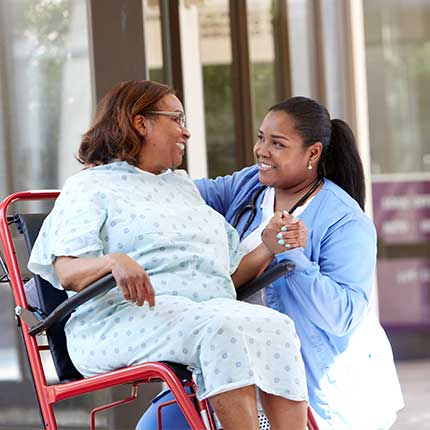COVID-19 Facts for Persons with Disabilities
Mar 19, 2020As cases of COVID-19 continue to rise in the United States, we know there are many questions, especially from those we care for that have neurological conditions. The CDC cautions that persons with underlying medical issues, such as neurological conditions, may be at risk of serious COVID-19, regardless of age. They define neurological conditions to include brain injuries, spinal cord injuries, multiple sclerosis (MS), stroke, cerebral palsy and muscular dystrophy, among others.
This is a new virus and therefore there are a lot of unknowns. It is an emerging and rapidly evolving situation. What we do know, is there are some specific precautions you can take to protect yourself and reduce community transmission of the virus. Dr. Michael Ajluni, Medical Director of the Neuroscience Unit at DMC Rehabilitation Institute of Michigan (RIM) and Dr. Michael Bush-Arnold, Medical Director of the Spinal Cord Injury Unit at RIM, provide some helpful information and guidelines for persons with disabilities.
What is Covid-19?
COVID-19 is the disease caused by the new coronavirus that emerged in China in December 2019. It is a respiratory illness that can spread easily from person to person. Symptoms include cough, fever and shortness of breath. There is no coronavirus vaccine yet.
Are persons with neurological conditions at greater risk of COVID-19?
Currently those at greatest risk of infection are persons who have had close contact with a person who has symptomatic, confirmed COVID-19. It is possible, that persons with neurological conditions that impair lung function or require a ventilator, and others with immunocompromising disorders like MS, may be at risk for more severe outcomes. “Lung capacity and volume can be impaired in persons with a spinal cord injury and other types of neurological conditions,” says Dr. Bush-Arnold. “Getting a deep breath or producing a strong cough to clear your lungs of fluid or mucous, may be hampered by muscles not working as strongly as they should. Temperature control can also be an issue in some persons with neurological conditions, making a fever more difficult to control,” he adds.What precautions should I take?
“Persons with disabilities should follow the same recommendations from the Centers for Disease Control (CDC),” says Dr. Ajluni. This includes:
- Individuals at risk of severe illness should stay home and keep away from others who are sick
- Wash your hands frequently for at least 20 seconds. If you have limited use of your hands or arms, and reaching a sink is difficult, use hand sanitizer that contains at least 60% alcohol.
- Avoid touching your nose, eyes and mouth
- Avoid non-essential travel and travel to affected areas
- Cough into your elbow, do not cover your cough with your hand
- Be sure to regularly disinfect surfaces that are frequently touched like counter tops, personal devices, faucet handles, toilets and door knobs. For wheelchair users, use bleach wipes to disinfect your push rims or joy stick.
What precautions should I take if I rely on a caregiver?
For people who rely on a caregiver for daily personal assistance, COVID-19 can be especially worrisome. What if my caregiver is sick? What if my caregiver can not work? Dr. Ajluni recommends:- Ask your caregiver to wear gloves or wash their hands every time they arrive, touch you, or provide food prep or feeding assistance
- Ask your caregiver to wear a mask if someone close to him/her is sick
- Encourage your caregiver not to come to work if they are sick
- Have a back up plan if your caregiver gets sick or the homecare agency has a shortage of providers. Are there backup attendants or family members or friends who could help with certain tasks? Prepare anyone you may need to rely on in an emergency.
- For more recommendations, visit the Center for Disability Rights
How should I be prepared?
“Maintain a supply of medications, food, medical supplies and other essentials,” says Dr. Bush Arnold. Consider alternative shopping options such as curbside pickup or online deliveries. If you have a service animal or pet, make sure you also have ample food and supplies.
What are we doing?
At DMC Rehabilitation Institute of Michigan, we are working closely with our infectious disease experts and closely monitoring guidelines from the CDC to keep our patients, staff, and community safe. Currently, we have restricted all visitors to the hospital and the DMC has set up an after hours COVID-19 hotline from 5:00 pm to 8:00 am, 7 days a week, for those who have questions. The number is 1-888-DMC-3370.What should I do if I think I might have COVID-19?
If you develop a fever, cough, sore throat or shortness of breath, isolate yourself from others and call your physician. If you don’t have a physician, call the Michigan Department of Health and Human Services at 888-535-6136. Please DO NOT go to a clinic, urgent care or emergency room unless you need that level of care. If you do need emergent care, call ahead if possible. For general information about COVID-19, please visit the Michigan Department of Health and Human Service’s website at www.Michigan.gov/Coronavirus



